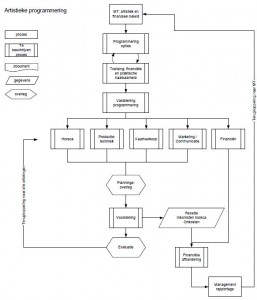In this ICT project management section of the site, you find under the Applications heading a multitude of ways to support work processes with the help of automation. In order to utilise these properly you must have a clear picture of your organisation’s work processes.

Process scan
TOT has developed a process scan: a way to analyse and clearly outline work processes. Process analysis is a logical product for Marijcke Voorsluijs who, as an industrial psychologist and the owner of TOT, thoroughly understands the business processes within the cultural sector. » read on about Process analysis
A process scan is a structured way to outline work processes. Within a cultural organisation, such a work process could, for example, be the realisation of a performance, exhibition or event – from the draft concept right up to evaluation.
Relay race
An organisation produces products and has suppliers and buyers. Within the organisation, each department produces a (partial) product with its own suppliers and buyers. The work process up to the product is a ‘relay race’ whereby different people or departments in turn pass the baton on to one another.
A process scan is achieved by interviewing key people (usually departmental heads) about their position within the relay race and their role in the realisation of the organisation’s products. » read on about Process scan at work
A process scan is not a document to be glanced at now and again. It can prove invaluable in practice.
A process scan:
- Is a tool to help you train new staff quicker;
- Shows the place and function of everyone’s work in the bigger picture;
- Shows the key moments within the process; if these are not (adequately) completed then the following stage will commence, but on an unstable foundation;
- Offers the possibility to translate the event-related steps into an event blue print – and even to refine it into a task list per department; » read on about The value of a process scan to your organisation
An eye on communication
Communication is everything: in the world of culture, just as everywhere else. Yet it does not always happen on its own. Seemingly opposing interests, different cultures, new legislation and regulation or organisational growth are all potential areas of conflict or friction.
At TOT, Marijcke Voorsluijs combines her industrial psychology expertise with more than 20 years of work experience in the cultural sector. She has resolved many issues for her clients, either on her own or in collaboration with other specialists in her network. » read on about Project management
